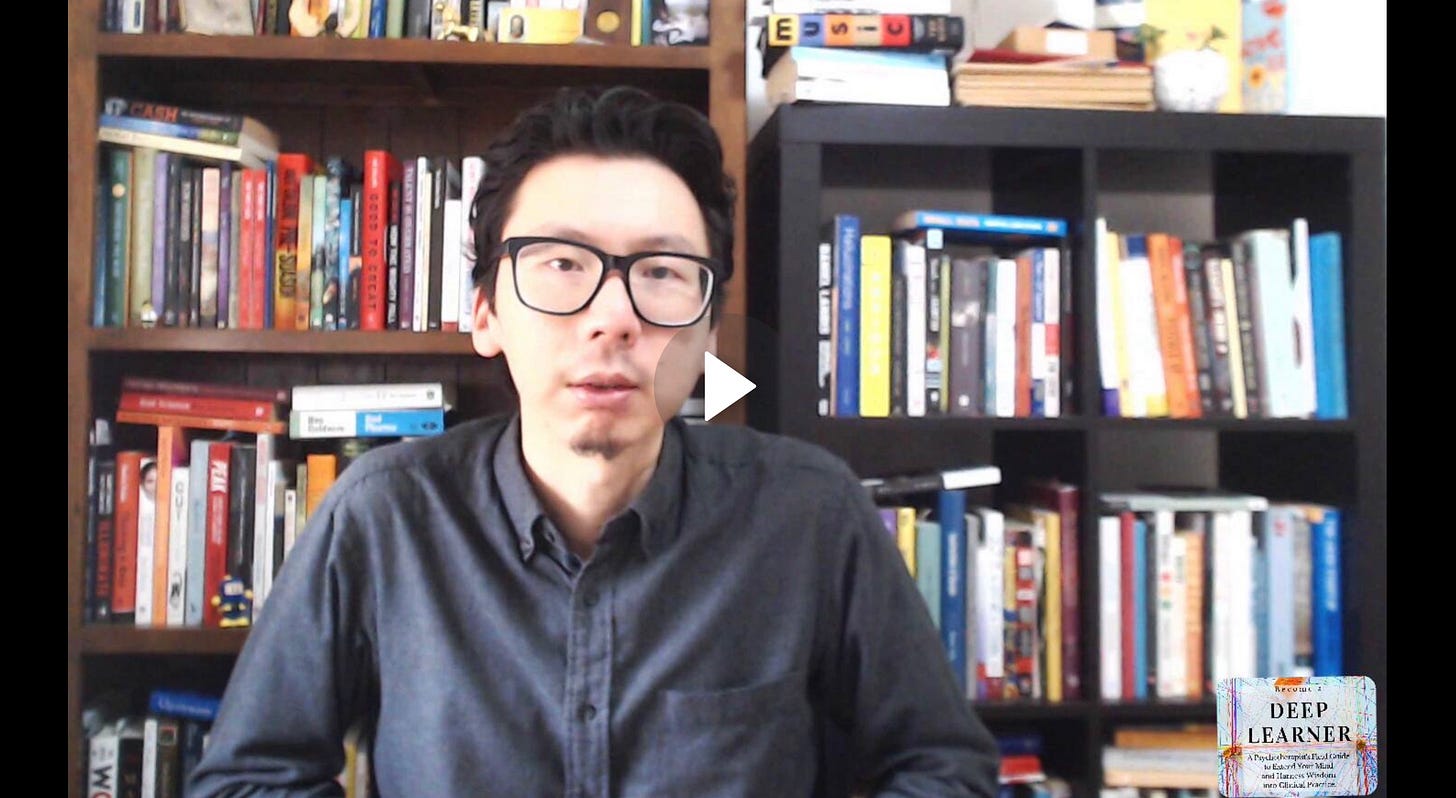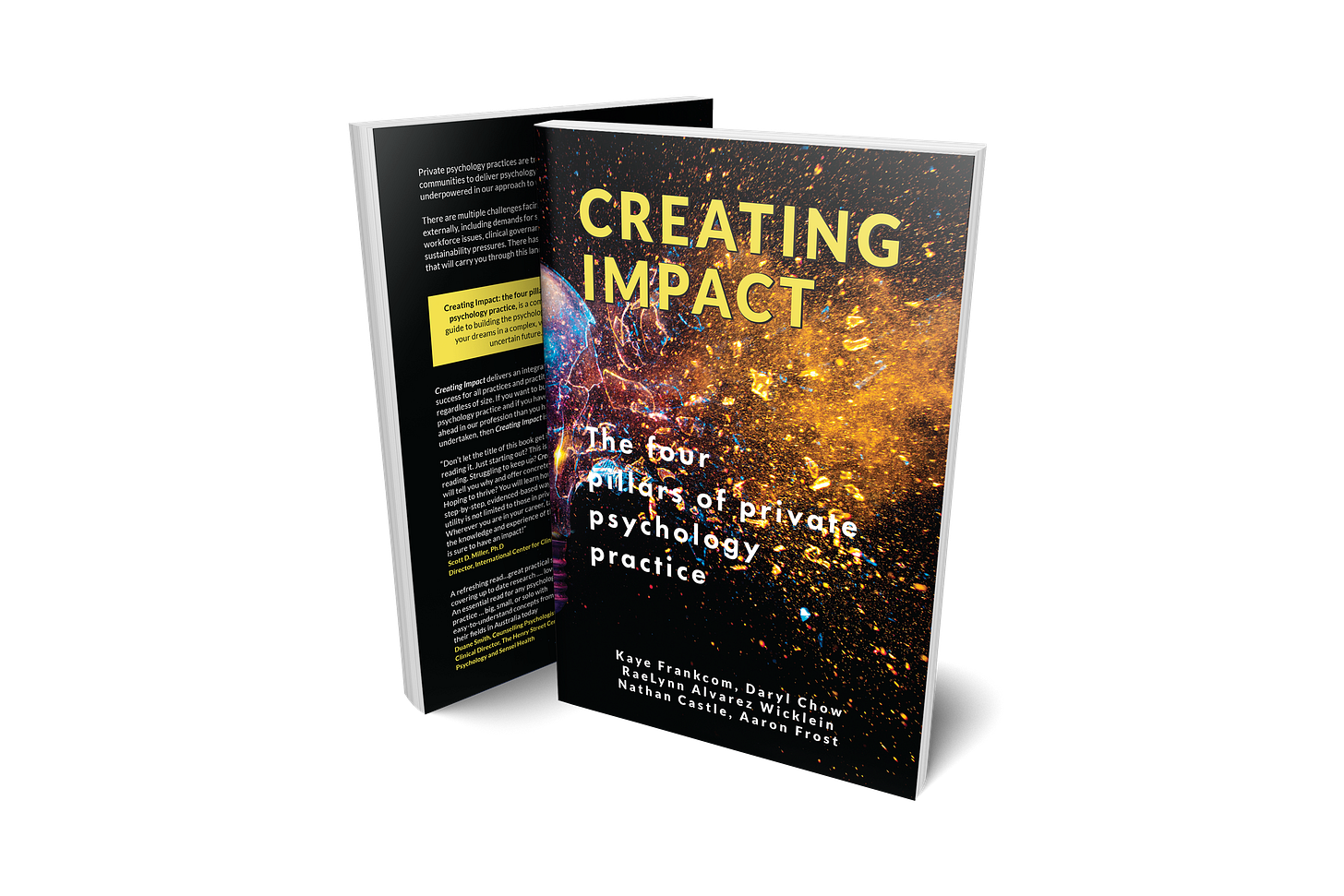Frontiers Friday 116: Play (Part I)
The Seriousness of Play and Its Purposeless Value.
One of the most profound ideas I've learned to take very seriously is the idea of play.
Playfulness is an antidote, play is a pattern-breaker.
Play is soulful. I don't practice an instrument, I play with an instrument.
Play is lens-widening.
Play is what we are deeply hungry for in the classroom, in our work, and in the bedroom.
But in so many ways, we are play-hungry.
The Shame of Not Doing It “Right”
One therapist recently said to me that since graduating, he carried an unspoken thought for some years. He harbored a shame that he wasn’t getting the supposed result from following what he was taught, especially since it was meant to be “best practice” i.e., evidenced-based practice.
The effect of this shame was that he didn't feel free to try things. He couldn't allow himself to explore. He couldn't be experimental. He realised something that he found it hard to admit at first: “Because I was so obsessed with getting it right, I couldn't really hear what clients were implicitly or explicitly telling me about their experience of the sessions.”
The biggest cost of not being able to flex and being playful was that he couldn't be himself.
The shame made him hide.
Thankfully, he didn’t let this shame rigidify or clam him down. Through being intentional and systematic about his development, and by becoming more responsive to the people he was working with, he found the freedom to allow himself to learn from his experience. The journey—and the healing— has begun.
He had to find not the “right” way to do therapy, but his way to be therapeutic.
In this new series on Frontier Friday #116, I will be providing recommendations and inspirations that made me deeply value importance of play, both in my profession-hood and person-hood.
📕Read: Play
This is a life-changing book by one of the leading researchers on play, Stuart Brown.
It didn’t really provide me with new insights per se, but rather, it helped named things for me.
It also made me take the idea of play more seriously in my life, especially since when I became a father. This played out as well in my work helping therapists in their professional development and clients who have lost a sense of playfulness in their lives.
Brown’s definition of play is useful:“Stepping out of a normal routine, finding novelty, being open to serendipity, enjoying the unexpected, embracing a little risk, and finding pleasure in the heightened vividness of life.”
Properties of Play:Apparently purposeless (done for its own sake)
Voluntary
Inherent attraction
Freedom from time
Diminished consciousness of self
Improvisational potential
Continuation desire.
📽 Watch: Play is More Than Just Fun
It was this TED talk by Stuart Brown that got me interested in his writings.
Here’s a snippet from this 2008 talk.
NEOTENY
“You may not know this word, but it should be your biological first name and last name. Because neoteny means the retention of immature qualities into adulthood. And we are, by physical anthropologists, by many, many studies, the most neotenous, the most youthful, the most flexible, the most plastic of all creatures. And therefore, the most playful. And this gives us a leg up on adaptability.”
🎧 Listen: Play, Spirit and Character
This might sound like an overkill on references by Stuart Brown, but this podcast episode is well-worth the listen.
Long-time readers of the Frontiers would know that I’m a fan of the On Being podcast.
In this conversation with Krista Tippet, Brown noted an interesting point, that lack of play as a child is often seen in violent individuals.👀 Sneak Peek into Deep Learner Course on Creating Play
In one of my courses aimed at helping practitioners become Deep Learners, I provided an exercise about examining your play history (Again, thanks to Stuart Brown’s work).
This is an important piece, which is why I’ve made this section of Deep Learner free to access.The comments from participants are deeply moving and instructive.
Note: Deep Learner is currently open for folks to join and go at their own pace.⏸ Words Worth Contemplating:
“A lack of play should be treated like malnutrition: it’s a health risk to your body and mind.”
~ Stuart Brown
Reflection
Take a moment to reflect on the following:
Think back to your memories as a child. What is your play history like? Vivify them in your mind’s eye as you recall these memories as a child…
“When have you felt free to do and be what you choose?
Is that a part of your life now? If not, why not?
Announcements
I want to take this chance to invite clinical supervisors to join the 13th cohort of Reigniting Clinical Supervision (RCS).
Are you a clinical supervisor?
If so, the online course Reigniting Clinical Supervision (RCS) that has been going on for more than 4 years is about to begin it’s next cohort.
Start Date: 2nd of Jan 2023, Mon.
Registration Closes: 30th of Dec 2023, Fri.
RCS is specifically designed to help you raise the bar of in supervision, and become more effectual with therapists, so that your positive impact promotes therapist’s development, and ultimately impact their clients.
Special Discount Code:
If you are reading on the Frontiers list do use the following exclusive 12% discount promo code: FRONTIERSVIP.
And if you are residing in a country where your currency is at a significant disadvantage, please drop me an email. If you are interested, I wanna help.
BIG HUGS TO NEW PEOPLE WHO ARE AT THEIR FRONTIER!
If you've just joined us, I'm glad you can join us at the "bleeding edge." Feel free to check out the back catalogue of Frontiers of Psychotherapists Development (FPD). You might also want to go into specific topics in the FPD Archives like
And if you want to see past newsletters, the entire archive is now made available in substack.
In case you missed it, see the most recent missives
Devotion to the Craft (6 Parts)
Caring for People in Organisations (3 Parts)
Clinical Supervision (3 Parts)
Feedback Informed Treatment (4 Parts)
Unintended Consequences (2 Parts)
Deep Learner (4 Parts)
Going Further with Deep Learner and The Use of Obsidian (6 Parts)
See What You Hear, Hear What You See (4 Parts)
Trauma (3 Parts)
Deliberate Practice (5 Parts)
Empathy (6 Parts)
Therapist Effects (2 Parts)
Client Point of View (4 Parts)
Tech Tools for Therapists (4 Parts)
Emotions (6 Parts)
Sensitivity (3 Parts)
Alliance (6 Parts)
My other blog site is called FullCircles: Reflections on Living
By the way, don't feel bad if you want to unsubscribe to this newsletter. This might not be for you. The last thing I want is to add to the anxious clutter of our inboxes.
Daryl Chow Ph.D. is the author of The First Kiss, co-author of Better Results, and The Write to Recovery, Creating Impact, and the forthcoming book The Field Guide to Better Results.
Note:
These newsletter are free, many hours are spent handpicking the curated list that make it to Frontiers Friday, as well as writing the essays and recording the videos and podcasts. Amazon affiliate links, if any, are to help ease the costs. You can also support the sustenance of this work by picking up any of the books, or gifting them to others.
Big thanks.
p/s: Please excuse any typos.
pp/s: Thank you for those who sent messages of love. My family and I have recovery from the visitation of covid.







